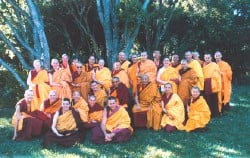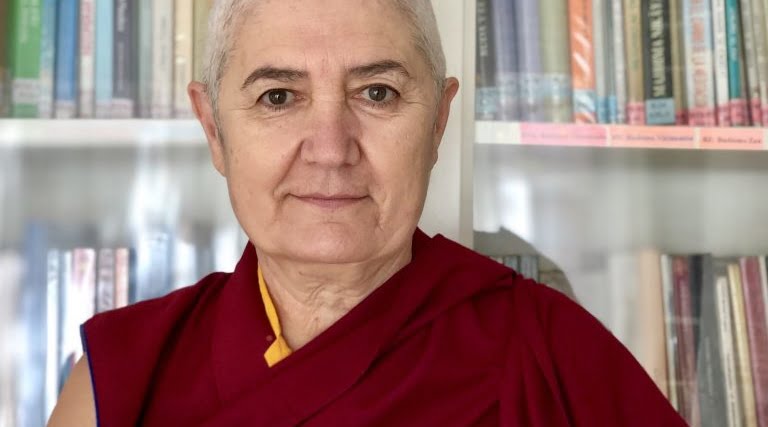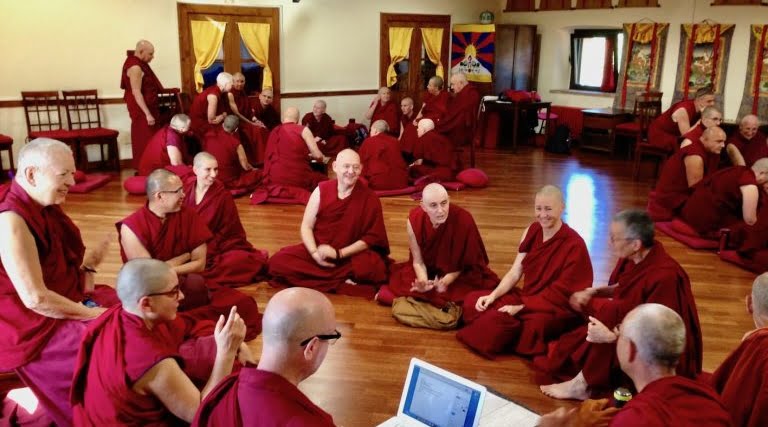With hundreds of sharp spikes, suited to
The horse of the mind, so hard to steer
And always driven with effort
Preparing for Ordination
Written by Ven. Thubten Dondrub
Motivation
Adopting the life of a renunciate is a life-long commitment in the Tibetan Buddhist tradition. One takes ordination because one realizes that this human life really is rare and precious and wants to use it in the most meaningful way-both for oneself and others-and to set up one’s life to have the conditions for practicing Dharma full-time.
Essentially, one takes vows in order to live in a disciplined way, free from distractions to following the path to liberation and enlightenment.
It is a wonderful thing to have a sincere wish to be ordained, but it is something that should not be entered into lightly.
Preliminaries
Taking ordination is a very serious matter, especially as the ordination is for life. To know what ordination really is and to be able to keep it well and for the rest of one’s life, ideally it is first necessary to have studied the teachings in order to develop a strong Refuge in the Triple Gem and especially in the Law of Cause and Effect, so that one takes formal Refuge. Then having practised the teachings for a considerable period of time as a layperson.
So first one has to take formal Refuge and then take and observe the five lay vows for some time. Also it would be very good to take the 8 Mahayana Precepts regularly during this period. To observe these for a day is to live like a monk for one day. Also it is good to have spent some time in retreat so that one has started to make a deeper connection with the Teachings and the practice of purification and accumulating merit. First do group retreats and then alone. This will also help give a taste of ordained life. Best retreats to try to do would be some lamrim, the Refuge preliminary and the three -month Vajrasattva retreat, if possible. It is only then that one can really say that the way of the lay Buddhist is not enough, I need to take life-long ordination.
Commitment to One Lineage
And in this process one needs to have a strong commitment to a particular Buddhist tradition, and especially to a particular personal Teacher who can confirm that it is suitable to take ordination and then guide one in that way of life from then on.
Just reading books on Buddhism and hearing a few teachings here and there from people one hasn’t developed a strong connection to, is not enough to act as a basis for becoming ordained and keeping that ordination for the rest of one’s life.
{Becoming ordained at Nalanda means that one should stay and study at the monastery for a period of at least 5 years. There is much to learn and practice and it is best if one can cultivate their ordination in a suitable environment. Besides, from the point of view of the spiritual path, 5 years is a relatively short period of time.} editor’s note
Living in the Community
Also it is very helpful to have already spent some time living in a Buddhist community to get some experience of community life, to see how the life suits you.

It is extremely important to understand that getting ordained is not something that can be done acting completely independently. One important thing to be aware of and think about is that although ordination is related to the path of ‘individual liberation’, and one can romanticise about the monks at the time of the Buddha living by themselves in remote forests etc., the reality is, and has been for more than a thousand years, that to be ordained means you enter and live in a monastic Community.
So one should be making a conscious decision to give up clinging to a private life and instead trying to live a relatively ‘selfless’ communal life. The ordination itself depends on receiving it from a community of monks, to do the essential fortnightly purification after ordination requires a community of monks, to keep the vows one has taken depends on observing them in relation to a monastic community.
Overcoming the Ego
The whole path is about overcoming ego and being ordained is about just that. Some westerners that get ordained do not understand this and use their ordination to keep themselves separate from others and go on to continue living self-centred lives.
Some people who get ordained find it very difficult to relate skillfully to authority and authority figures, but this is exactly what is involved in taking ordination- there is so much emphasis in the Vinaya for junior monks to respect their elders, and also to be worthy of respect for those junior to themselves and to the lay community.
The reason for this emphasis in the Vinaya is that this mutual respect is essential for the survival of the sangha. The real sangha is a real community – not just people living physically together, but sharing in many ways a common goal, view, way of life, etc. And even when not living physically together, there has to be that heart feeling of belonging to the Sangha community. So, if you want to be totally “free” to go wherever and do whatever you want in your practice of dharma, don’t become a monk.
To become a monk involves surrendering – or at least wanting to, trying to. If you don’t have this wish, or the wish to try to, don’t become a monk. All this relates to the practical point of where will you live as a monk. If you are already connected to some Buddhist community and a teacher, then you will automatically have some of the support you need when you become a monk.
How to Support Yourself
For example, if you live at Nalanda it is 4.5 Euros/day to stay here for monks. But to become resident here first you need to be here as a monk for a probationary period. Ideally you would need your own support for one or two years, then if you show that you are sincere, stable, and involved with the life, then it would be possible to get some basic support to stay here.
Our founder, Lama Yeshe always encouraged his students who were thinking to ordain to make sure that they already had enough money to support themselves for three years as a monk/nun before getting ordained. After that time, if one has been following vinaya well, then some support should come. It is really not suitable to go out working as a monk, and it is also extremely difficult to keep the vows in such a situation.
Before getting ordained it would be useful to check with Lama Thubten Zopa Rinpoche what one should do and where one will live after getting ordained. Rinpoche has said that monks should stay in the one place for five years after their ordination.
It is also very important that all debts be cleared up before taking ordination. So even if you don’t have any money, you should not be in debt. Also all family and legal matters should be cleared up so that there are no potential problems that could develop after becoming ordained. Such things can affect not just oneself but also create problems for the Sangha.



